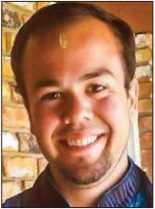How Hinduism differs from the many other paths I have walked
BY KESHAV FULBROOK

AT AGE THIRTEEN I DECIDED to leave Christianity, the religion of my birth, driven forth by a knowing that the relationship between man, God and the world was very different from what I had been taught. After reading the works of mystics, I finally concluded that Divinity is manifest as the Universe itself and that Divinity is also the context in which the Universe exists. God and man are one.
In my search for Truth I explored Western Neo-Paganism, Buddhism and eventually identified as SBNR or “spiritual but not religious.” However, in all my searching I found a common thread. Each of these movements’ most eye-opening, paradigm-shifting works ultimately credited a Hindu sacred text or guru.
I didn’t understand Hinduism, though. Nothing from school, my peers or the media had ever presented an accurate and full picture. I had also developed the misconception that you must share an ethnic identity to be Hindu. Thankfully, I later learned this to be completely false.
When I was 19, I met a man named Anupam who was starting a local Bhagavad Gita study group. Throughout my attendance, I became amazed by the Gita’s insights and also by Anupam himself. He constantly strived to practice these ideals in his day-to-day life. While he was a man with many degrees and a high paying job, he lived a modest, spiritual life. His every moment was a sadhana. I continued helping with these classes for some time after Anupam had moved away, before I also left and intensified my own personal scriptural studies of the Upanishads.
It was in 2013 that my life as an ardent Hindu became solidified. It was an incredibly difficult year, with health issues, a car accident and related financial problems. During this time of immense challenge, I found intense new depths in my meditations. I feel I began to experientially perceive some of the truths that were once only intellectual ideas. This fostered a firm dedication to the Sanatana Dharma. I began to study the Master Course under the auspices of Kauai Aadheenam, as well as take courses from Arsha Vidya Gurukulam. It is now my mission to share the gifts that Hinduism has given me.
Back when I considered myself SBNR, I thought anything religious to be too restrictive. I felt religion to be an outdated list of do’s and do-not’s laid down by someone long gone. I thought dedication to one religion would limit growth. But with a structured religious life and through meditation, you can actually begin to experience what Hinduism’s sacred scriptures speak of in a depth and detail found in no other path on Earth. Hindu dharma is a process, a science and a particular high vision of life. It is in no way limiting of one’s freedom to explore and inquire, and in fact it urges you to do so! It is a complex, living system of practices designed to help a person grow into their fullest potential.
Many in the West have only taken individual disciplines from Hinduism: hatha yoga, meditation, ayurveda and so on. I have found that, while these disciplines can be effective on their own, they are exponentially more so when included together, working in union to help a person on the path. Our religion has such diversity that one is free to choose whatever avenue of spiritual unfoldment suits him or her, often with guidance of a guru and a community of peers. It is freedom with responsibility. The Hindu is free and strives to use this freedom to uplift self and others, to serve the community, and to come to the realization of Divinity within oneself and within every living thing. Aum Namah Sivaya.
KESHAV FULBROOK, 25, is a student at the University of Montana. He is active in the Hindu community and seeks to raise awareness of Hinduism and Hindu issues. Email: fulbrookb22@gmial.com